Rep. Michael McCaul (R-Texas) on April 6 accused the Biden administration of not adequately following through on the delivery of arms and technology earmarked for bolstering Taiwan’s defenses, which he said poses a danger not just to the self-ruled island, but to U.S. interests in the region.
At a Wednesday House Foreign Affairs Committee hearing, McCaul aggressively questioned Deputy Secretary of State Wendy Sherman about what he sees as the lack of follow-through on promises made to Taiwan in the areas of defense and trade.





